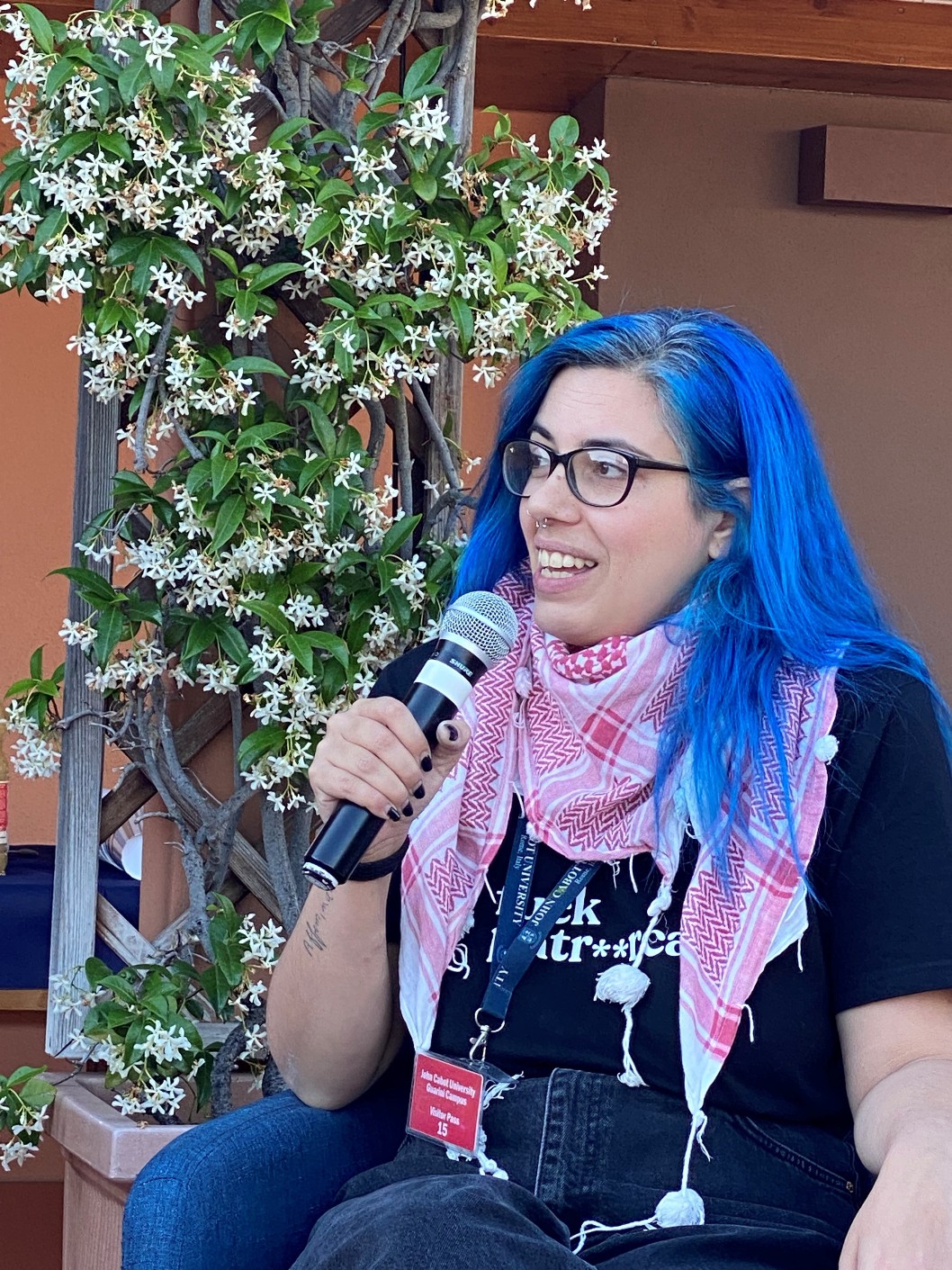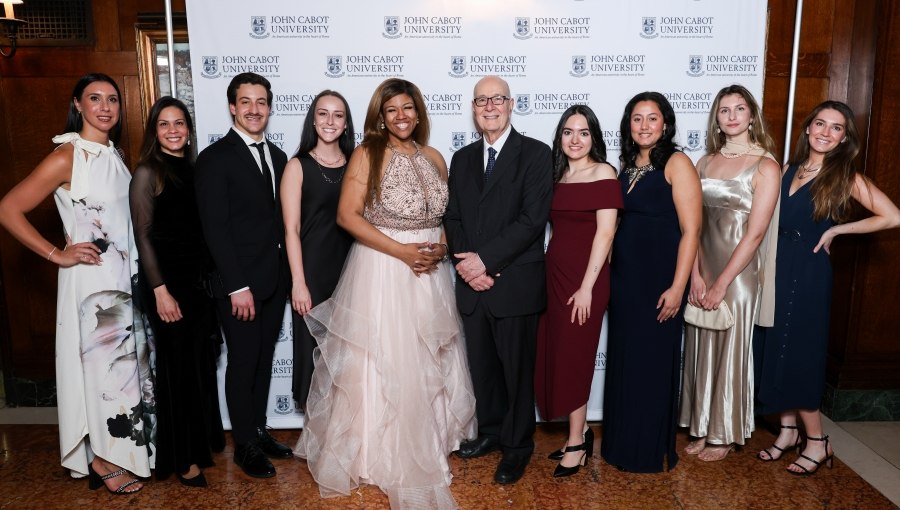Translation as Activism: JCU Welcomes Marzia D’Amico
On June 3, the Institute for Creative Writing and Literary Translation, sponsored by JCU’s Department of English Language and Literature, hosted “Translation as Activism,” a conversation between writers and translators Allison Grimaldi Donahue and Marzia D’Amico.
Allison Grimaldi Donahue is an artist, poet (Body to Mineral, 2016; On Endings, 2019), translator, and educator. She is the translator of Italian art critic and activist Carla Lonzi’s Self-Portrait (Divided Publishing, 2021) and is currently working on a translation of work by Swiss writer Alice Ceresa. In July 2024 Grimaldi Donahue will be running a multi-lingual poetic writing workshop, The New Orpheus, as part of the public program Jean Cocteau: the Juggler’s Revenge, at the Guggenheim Museum in Venice, Italy. She is currently teaching Creative Writing Workshop: Writing the Eternal City and Creative Writing and Studio Art Workshop at JCU.

Marzia D’Amico, poet and translator, has a Ph.D. in Italian Studies from Oxford University and is currently FCT Junior Researcher at CEComp (Centro de Estudos Comparatistas) at the University of Lisbon, Portugal. In their Ph.D., they investigated genre revision and women’s authorship in 20th century Italy, analyzing Amelia Rosselli and Patrizia Vicinelli’s intentional epic genre deconstruction. D’Amico’s original prose, poetry, and cultural contributions were featured on radio, on paper, and online. Their collection of poems, Liricologismo, was published in 2023 by Zacinto Edizioni. Most recently their poem, Ragazzə laser, was published in Nuovi Argomenti, and won the Elio Pagliarani prize for original poetry.
Introducing D’Amico to the audience, Grimaldi Donahue mentioned that they originally met through their shared interest in the work of Italian poet, writer, photographer, and translator Giulia Nicolai. Grimaldi Donahue said she was endlessly surprised by D’Amico’s breadth of knowledge and curiosity for literature, gender, language and experimental writing, and by their joining academic research in feminist and queer literature, translation, and experimental poetry. Grimaldi Donahue started by asking D’Amico about what she called their polyglotism and translingualism. To what extent is it possible to live and write in between languages?
D’Amico, who was born and raised in Rome in a multilingual environment by a mother who teaches English language and literature, first learned English through exposure to music and film, but then moved Oxford to pursue a Ph.D. in Italian Studies, and is now living in Portugal, while speaking French with their family. When they started writing, D’Amico found they could not immediately create poetry in their native language but discovered that using English as a linguistic filter gave them the strength to return to writing in Italian and express what they were trying to convey. They now see Italian as “a means to discover a new identity, mixing the languages together in a private and political activity.” Listening to a performance of their poetry translated into Albanian, a language D’Amico doesn’t know, they realized that the power of literature transcends the words.
Grimaldi Donahue then asked D’Amico whether they considered their writing and translating as separate activities. D’Amico confirmed that they used to consider them separately but are now beginning to question that separation: being lucky enough not to have to live off the earnings from translating, thanks to their academic position at Lisbon University, they claimed the privilege of choosing what they considered important and necessary to translate. They were so lucky, in fact, that because of their research and poetry they were asked to translate the kind of texts they were already interested in politically and culturally – and so they can dedicate themselves to projects that are a continuation of their writing and academic interests.
Through their activism, D’Amico met Chiara Reali, translator of American author Torrey Peter’s Detransition Baby (One World, 2021). Reali shares D’Amico’s view that Italian studies needs to break free of certain conventions and that the translation of new work by queer and trans authors was politically important. To this end, Reali invited them to collaborate on translating literature that would otherwise not be read in Italy.
Grimaldi Donahue reminded the audience that only about 3% of all books published in the United States are works in translation. Publishers want to translate books that sell, and that doesn’t mean necessarily the literature we want to read. How does D’Amico choose what to work on?
D’Amico explained that – though they would never expect anyone to work for free or to subject themselves to cultural exploitation – there were projects that “as a queer bisexual person in a position of privilege I want to do. That is, for me, a kind of activism.” Certainly, they clarified, they have no intention of taking the space of someone who should be allowed to speak for themselves, but “I offer myself to dress up as someone else” and give them their voice so that these authors can be heard when they might otherwise be silenced.
Grimaldi Donahue then asked D’Amico if they feel a particular responsibility not only towards their community, but also to make a text more palatable or accessible to an audience. D’Amico acknowledged that sometimes there is real danger of the audience misunderstanding where the text is coming from. They brought the example of the translation they did of the short story by American author Isabel Fall, I Sexually Identify as an Attack Helicopter, a finalist for the 2021 Hugo award for science fiction. Chiara Reali, curator of the series 42 Nodi, and Giorgio Raffaelli, editor of Zona 42, wanted this project to be contextualized critically and so they asked D’Amico to also write an afterword. The story, translated into Italian as Il racconto dell’elicottero, was written by Fall, a trans woman, in reaction to a transphobic meme that ridiculed the concept of chosen identity. In a dystopian fallout, Fall herself was accused of being transphobic and finally outed as trans before she was willing to do so. Having written the afterword to this text and reflected on it from a critical perspective, D’Amico said, “when I turned to translate it, I knew very clearly what the text could do in the Italian cultural environment, although it took me ages to complete the translation.”
In conclusion of their talk, D’Amico explained how they came to find themselves in the position of translating for advocacy and passion: by sharing their interests and passions on-line, through a feminist newsletter that they co-edit, D’Amico positioned themselves where people would seek them out and ask them to translate the kind of texts they were already working on and that they wanted to see published in Italian.
D’Amico concluded by saying that there is a need for more people from different environments suggesting texts that need translating: “stand up for that, say it publicly, and you will be heard, and you will find your community and contribute to its visibility.”
Grimaldi Donahue asked D’Amico to read some of their poetry in English to the audience, and a lively session of Q&A brought the event to a close.
The events of the Institute for Creative Writing and Literary Translation continue through June.





